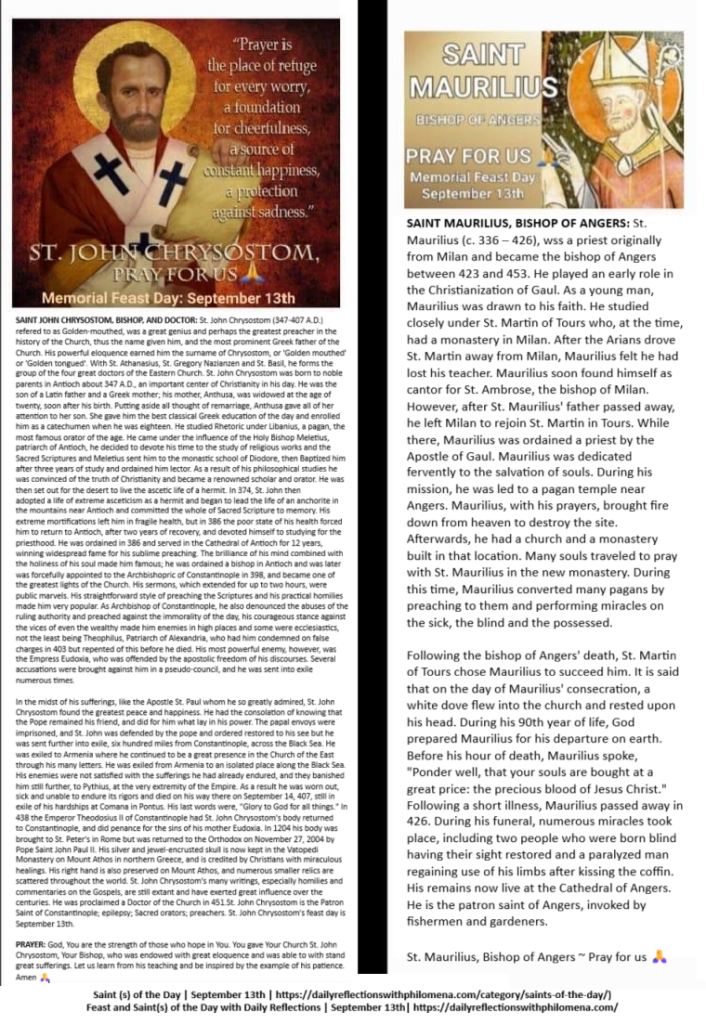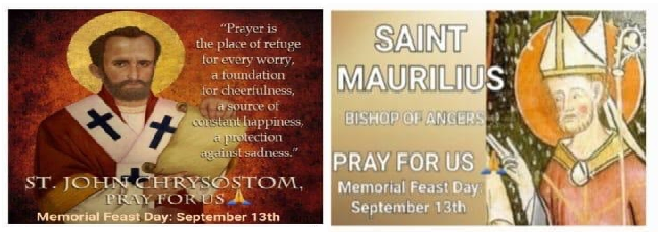
MEMORIAL OF SAINT JOHN CHRYSOSTOM, BISHOP, AND DOCTOR AND SAINT MAURILIUS, BISHOP OF ANGERS ~ FEAST DAY: SEPTEMBER 13TH: Today, we celebrate the Memorial of Saint John Chrysostom, Bishop and Doctor and Saint Maurilius, Bishop of Angers. Through the intercession of our Blessed Mother Mary and the Saints on this feast day, we humbly pray for the sick and dying, especially those who are mentally and physically ill and those suffering from cancers and other terminal diseases. We pray for the souls in Purgatory and the repose of the souls of the faithful departed. We pray for the poor and needy and for peace, love, and unity in our marriages, our families, and our world. And we continue to pray for our Holy Father, the Bishops, the Clergy, for vocations to the priesthood and religious life, for the Church, for persecuted Christians, for the conversion of sinners, and Christians all over the world…. Amen🙏
SAINT JOHN CHRYSOSTOM, BISHOP, AND DOCTOR: St. John Chrysostom (347-407 A.D.) refered to as Golden-mouthed, was a great genius and perhaps the greatest preacher in the history of the Church, thus the name given him, and the most prominent Greek father of the Church. His powerful eloquence earned him the surname of Chrysostom, or ‘Golden mouthed’ or ‘Golden tongued’. With St. Athanasius, St. Gregory Nazianzen and St. Basil, he forms the group of the four great doctors of the Eastern Church. St. John Chrysostom was born to noble parents in Antioch about 347 A.D., an important center of Christianity in his day. He was the son of a Latin father and a Greek mother; his mother, Anthusa, was widowed at the age of twenty, soon after his birth. Putting aside all thought of remarriage, Anthusa gave all of her attention to her son. She gave him the best classical Greek education of the day and enrolled him as a catechumen when he was eighteen. He studied Rhetoric under Libanius, a pagan, the most famous orator of the age. He came under the influence of the Holy Bishop Meletius, patriarch of Antioch, he decided to devote his time to the study of religious works and the Sacred Scriptures and Meletius sent him to the monastic school of Diodore, then Baptized him after three years of study and ordained him lector. As a result of his philosophical studies he was convinced of the truth of Christianity and became a renowned scholar and orator. He was then set out for the desert to live the ascetic life of a hermit. In 374, St. John then adopted a life of extreme asceticism as a hermit and began to lead the life of an anchorite in the mountains near Antioch and committed the whole of Sacred Scripture to memory. His extreme mortifications left him in fragile health, but in 386 the poor state of his health forced him to return to Antioch, after two years of recovery, and devoted himself to studying for the priesthood. He was ordained in 386 and served in the Cathedral of Antioch for 12 years, winning widespread fame for his sublime preaching. The brilliance of his mind combined with the holiness of his soul made him famous; he was ordained a bishop in Antioch and was later was forcefully appointed to the Archbishopric of Constantinople in 398, and became one of the greatest lights of the Church. His sermons, which extended for up to two hours, were public marvels. His straightforward style of preaching the Scriptures and his practical homilies made him very popular. As Archbishop of Constantinople, he also denounced the abuses of the ruling authority and preached against the immorality of the day, his courageous stance against the vices of even the wealthy made him enemies in high places and some were ecclesiastics, not the least being Theophilus, Patriarch of Alexandria, who had him condemned on false charges in 403 but repented of this before he died. His most powerful enemy, however, was the Empress Eudoxia, who was offended by the apostolic freedom of his discourses. Several accusations were brought against him in a pseudo-council, and he was sent into exile numerous times.
In the midst of his sufferings, like the Apostle St. Paul whom he so greatly admired, St. John Chrysostom found the greatest peace and happiness. He had the consolation of knowing that the Pope remained his friend, and did for him what lay in his power. The papal envoys were imprisoned, and St. John was defended by the pope and ordered restored to his see but he was sent further into exile, six hundred miles from Constantinople, across the Black Sea. He was exiled to Armenia where he continued to be a great presence in the Church of the East through his many letters. He was exiled from Armenia to an isolated place along the Black Sea. His enemies were not satisfied with the sufferings he had already endured, and they banished him still further, to Pythius, at the very extremity of the Empire. As a result he was worn out, sick and unable to endure its rigors and died on his way there on September 14, 407, still in exile of his hardships at Comana in Pontus. His last words were, “Glory to God for all things.” In 438 the Emperor Theodosius II of Constantinople had St. John Chrysostom’s body returned to Constantinople, and did penance for the sins of his mother Eudoxia. In 1204 his body was brought to St. Peter’s in Rome but was returned to the Orthodox on November 27, 2004 by Pope Saint John Paul II. His silver and jewel-encrusted skull is now kept in the Vatopedi Monastery on Mount Athos in northern Greece, and is credited by Christians with miraculous healings. His right hand is also preserved on Mount Athos, and numerous smaller relics are scattered throughout the world. St. John Chrysostom’s many writings, especially homilies and commentaries on the Gospels, are still extant and have exerted great influence over the centuries. He was proclaimed a Doctor of the Church in 451.St. John Chrysostom is the Patron Saint of Constantinople; epilepsy; Sacred orators; preachers. St. John Chrysostom’s feast day is September 13th.
PRAYER: God, You are the strength of those who hope in You. You gave Your Church St. John Chrysostom, Your Bishop, who was endowed with great eloquence and was able to with stand great sufferings. Let us learn from his teaching and be inspired by the example of his patience. Amen 🙏
QUOTES OF SAINT JOHN CHRYSOSTOM:
☆ “When you are before the altar where Christ reposes, you ought no longer to think that you are amongst men; but believe that there are troops of angels and archangels standing by you, and trembling with respect before the sovereign Master of Heaven and earth. Therefore, when you are in church, be there in silence, fear, and veneration.”
☆ “If the Lord should give you power to raise the dead, He would give much less than He does when he bestows suffering. By miracles you would make yourself debtor to Him, while by suffering He may become debtor to you. And even if sufferings had no other reward than being able to bear something for that God who loves you, is not this a great reward and a sufficient remuneration? Whoever loves, understands what I say.”
SAINT MAURILIUS, BISHOP OF ANGERS: St. Maurilius (c. 336 – 426), wss a priest originally from Milan and became the bishop of Angers between 423 and 453. He played an early role in the Christianization of Gaul. As a young man, Maurilius was drawn to his faith. He studied closely under St. Martin of Tours who, at the time, had a monastery in Milan. After the Arians drove St. Martin away from Milan, Maurilius felt he had lost his teacher. Maurilius soon found himself as cantor for St. Ambrose, the bishop of Milan. However, after St. Maurilius’ father passed away, he left Milan to rejoin St. Martin in Tours. While there, Maurilius was ordained a priest by the Apostle of Gaul. Maurilius was dedicated fervently to the salvation of souls. During his mission, he was led to a pagan temple near Angers. Maurilius, with his prayers, brought fire down from heaven to destroy the site. Afterwards, he had a church and a monastery built in that location. Many souls traveled to pray with St. Maurilius in the new monastery. During this time, Maurilius converted many pagans by preaching to them and performing miracles on the sick, the blind and the possessed.
Following the bishop of Angers’ death, St. Martin of Tours chose Maurilius to succeed him. It is said that on the day of Maurilius’ consecration, a white dove flew into the church and rested upon his head. During his 90th year of life, God prepared Maurilius for his departure on earth. Before his hour of death, Maurilius spoke, “Ponder well, that your souls are bought at a great price: the precious blood of Jesus Christ.” Following a short illness, Maurilius passed away in 426. During his funeral, numerous miracles took place, including two people who were born blind having their sight restored and a paralyzed man regaining use of his limbs after kissing the coffin. His remains now live at the Cathedral of Angers. He is the patron saint of Angers, invoked by fishermen and gardeners.
St. Maurilius, Bishop of Angers ~ Pray for us 🙏
